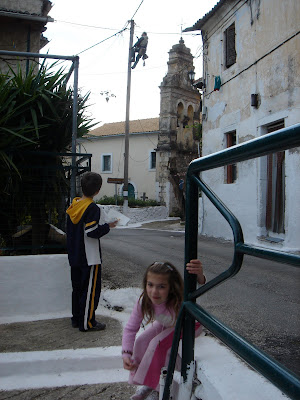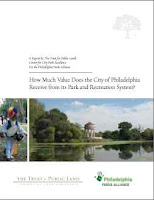
 But Kostas Apergis, village historian, writes of the diminished celebration in Ano Korakiana of 25 March - Greek Independence Day. He mentions that 'the sympathetic settlers' or, perhaps, 'charming colonists' - συμπαθέστατοι έποικοι - have not yet devised their own contribution to what in earlier days was a richer event:
But Kostas Apergis, village historian, writes of the diminished celebration in Ano Korakiana of 25 March - Greek Independence Day. He mentions that 'the sympathetic settlers' or, perhaps, 'charming colonists' - συμπαθέστατοι έποικοι - have not yet devised their own contribution to what in earlier days was a richer event: Με τη φυγή του κόσμου, το κλείσιμο των μαγαζιών και την αδιαφορία(;) όσων απέμειναν έσβησε κι αυτό, οι δε συμπαθέστατοι έποικοι ακόμη δεν ύψωσαν τη δική τους. Ελάχιστοι πια θυμούνται τις μέρες αυτές το εθνικό μας σύμβολο.Έχει απομείνει, μετά τη δημιουργία του Δήμου και τη μεταφορά των εκδηλώσεων στον Ύψο, μια βιαστική Δοξολογία στον Άη Γιώργη και μια πιο βιαστική «παρέλαση» του Σχολείου και της Φιλαρμονικής κατά την μετάβασή τους στον Ύψο και την Πόλη. Στο πέρασμά τους από τον κεντρικό δρόμο του χωριού ακουγόταν και κανένα εμβατήριο, έτσι να θυμίσει στους γέρους και γενικά στους ανήμπορους, που παρέμειναν στα σπίτια τους το ξεχωριστό της ημέρας.

Democracy Street ~ 25 March 2010
But there is another dimension to this story. Leftheris has told me, and it's confirmed by Thanassis and Katya as well as by Hilary Paipeti, that neither Ano Korakiana's band nor the band of Kinopiastes, the village south of Corfu town, were wont to join in annual celebrations of the anniversary of enosis with mother Greece on 21 May 1864. Perhaps this lack of enthusiasm for the event in May extends to the celebration of Greek Independence on 25 March - anniversary of an event in 1829, 35 years before the Ionian Islands became part of the Hellenic Kingdom. This is not, as some might claim because many Ionians didn't want the British to leave - an imputation that applied to relatively few - but because there was a robust aspiration among a much larger part of the Ionian population, originally driven by the rizospastai, especially Ilias Zervos from Cephalonia, to become an autonomous republic - the Septinsular Republic of the Ionian islands - a situation for which there was a conditional precedent between 1800 and 1807 (for background see my YouTube slides on the Ionian Protectorate). While the majority rejoiced in enosis and the departure of the British, there were others no less radical who wished the British had stayed on long enough to negotiate a departure, not from an Hellenic Kingdom enlarged by the acquisition of the Ionian Islands but from a Septinsular able to fly its own flag.
While the majority rejoiced in enosis and the departure of the British, there were others no less radical who wished the British had stayed on long enough to negotiate a departure, not from an Hellenic Kingdom enlarged by the acquisition of the Ionian Islands but from a Septinsular able to fly its own flag.*** ***
...and this is how Independence Day was for TeacherDude, British citizen-journalist in the streets of Thessaloniki.
* * *
The electricity wouldn’t come on at 208. A customer at our shop phoned the electric company in Corfu town for us. “For less than €50 they won’t cut you off” he said. I phoned Ian, electrician. He was round in an hour to test the meter. “No power to the meter. I saw the first swallows yesterday. The thermals have been right for them. Ring 1050 - the emergency number.” I was answered in seconds and we could speak in English (try that in UK). “It’s very busy but someone will be out to you later today.” Yes, we could run a cable to the neighbour’s supply to power our fridge, but Sally, up the street, gave us space in her freezer. We walked our shopping there and while chatting I got a call from a lineman. “Check the power now.” I ran back up the street, mobile to my ear, gasping “nearly there, nearly there.” Still no power. “OK. Wait by the school. Two men in a black truck will be with you in 5 minutes.” I waited; they came; checked the meter again.
One with climbing claws on his boots checked a cat’s cradle of wires at the top of a nearby street pole, turning off neighbouring supplies in turn. Still no power. Then one of the men, with a ladder, checked along our supply cable and found the wire overstretched just above the meter. Wind and weather had severed the wire inside its sheathing so it didn’t appear broken until a gentle tug pulled it apart. All sorted before dark.
** ** ** 

 *** *** ***
Email from the blue:
*** *** ***
Email from the blue:
I was in Scotland yesterday, with councillors from Dumfries and Galloway. I woke in my guest house to gaze on the lowland landscape and see lambs hurrying to suckle under a dour sky and distant hills. It was a good day's work with a dozen councillors working hard and intelligently on ways Overview & Scrutiny could improve their council's service to the public, preparing - after Audit Scotland's Best Value and Community Planning audit last March when the Chairman of the Accounts Commission, John Baillie, said:
There are serious weaknesses at Dumfries and Galloway Council which would be of concern in any circumstances. They are even more concerning given the significant challenges facing the council. These make it essential that action is taken as a matter of urgency to move the council forward.Councillors were also aware of Audit Scotland's report on Improving Public Sector Efficiency - anticipating some of the deepest cuts in public service expenditure any of us have experienced.
The lowlands from Southpark House, Locharbriggs
* * *
I've received - via the web - a most useful and intriguing document on the economic value of public parks. It's been done in Philadelphia in Pennsylvania. The eponymous report is a godsend for defending urban green space during recession.
Prepared two years ago (why've I not come across it earlier?) it's swirling among professionals as well as campaigners for public parks, like Birmingham Open Spaces Forum. Ten years ago I wrote a few pages for a government committee about the value of urban green spaces. This report by The Trust for Public Land’s Center for City Park Excellence has garnered a swaithe of professional jargon - assessing the value to the city of stormwater management, air pollution mitigation, community cohesion, health and wealth value to citizens including 'property value from park proximity' and from tourism - to support more lyrical arguments for parks. Thus does political rhetoric transmute into managerial and professional language.
** * **
Lin's been working later icing the various layers of Amy and Guy's wedding cake made by her mum, Amy's nan. We've been immersed in argument's about planning - invitations, accommodation, travel to the Highlands in May, and cakes. The last row between Amy and her mum took two days to simmer down; both refusing to back off and apologise while I attempted mediation. Now they've made a truce perhaps I'll cycle into town and donate some blood.
Dear Simon Baddeley. I found your contact from a blog by John Tyrrell while I was trying to find something on the 'Black Patch' Birmingham. The reason for this I am trying to build a Smith Family Tree and I have found that my Grand Father who lived in Ladywood , was known as 'Darkie Smith' and came from Gypsies or associated with them. He was called Darkie because he had a slightly darker skin. Since talking to my brother in law he said Gypsies were know in a place called the Black Patch. Do you have any other information on the history of this place or know of anybody who does. Best regards. Martin Smith, Antwerp, BelgiumBlack Patch, c.1890. Gypsies criss-crossed England from as far away as Armenia, Serbia and Greece, finding work on farms, helping with the summer harvests.Dear Martin. Delighted to hear from you. Try contacting Ted Rudge who wrote a fine book some years ago (out of print at present) called Brumroamin: Birmingham and Midland Romany Gypsy and Traveller Culture and refers, on his local history blog, to our successful campaign to prevent building on the park . See also this clip of a petition about the Black Patch and this song about Queen Henty, who lived with other Gypsies on the Black Patch and a wikipedia article on Black Patch with more links you may find useful. My stepfather was Jack Hargreaves who died in 1994. One of his good friends was the late Len Smith who wrote about Gypsies in and around the New Forest - Romany Nevi-Wesh. I hope this is helpful. Ted Rudge is your best source. I hope you can get in touch with him. Best wishes. Simon

No comments:
Post a Comment